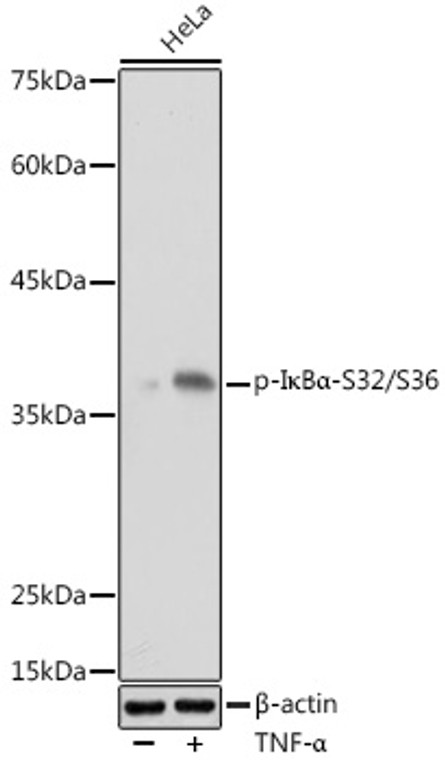| Host: |
Rabbit |
| Applications: |
WB |
| Reactivity: |
Human |
| Note: |
STRICTLY FOR FURTHER SCIENTIFIC RESEARCH USE ONLY (RUO). MUST NOT TO BE USED IN DIAGNOSTIC OR THERAPEUTIC APPLICATIONS. |
| Short Description: |
Rabbit polyclonal antibody anti-Phospho-I Kappa B Alpha-S32/S36 is suitable for use in Western Blot research applications. |
| Clonality: |
Polyclonal |
| Conjugation: |
Unconjugated |
| Isotype: |
IgG |
| Formulation: |
PBS with 0.01% Thimerosal, 50% Glycerol, pH7.3. |
| Purification: |
Affinity purification |
| Dilution Range: |
WB 1:100-1:500 |
| Storage Instruction: |
Store at-20°C for up to 1 year from the date of receipt, and avoid repeat freeze-thaw cycles. |
| Gene Symbol: |
NFKBIA |
| Gene ID: |
4792 |
| Uniprot ID: |
IKBA_HUMAN |
| Immunogen: |
A synthetic phosphorylated peptide around S32 & S36 of human I Kappa B Alpha (NP_065390.1). |
| Immunogen Sequence: |
SGLDS |
| Post Translational Modifications | Phosphorylated at Ser-32 and Ser-36 by IKKA/CHUK and IKKB/IKBKB.disables inhibition of NF-kappa-B DNA-binding activity. Phosphorylation at positions 32 and 36 is prerequisite to recognition by the SCF(FBXW11) and SCF(BTRC) complexes, leading to polyubiquitination and subsequent degradation. Phosphorylated at Ser-32 in response to FK506 treatment: phosphorylation is independent of IKKA/CHUK and IKKB/IKBKB and promotes NFKBIA degradation, followed by NF-kappa-B activation. Phosphorylated at Tyr-42: its effect is however unclear. According to a report, phosphorylation at Tyr-42 activates NF-kappa-B without triggering proteolytic degradation of NFKBIA. According to another publication, phosphorylation at Tyr-42 inhibits NF-kappa-B activity by preventing phosphorylation at Ser-32 and Ser-36 and subsequent ubiquitination and degradation. Polyubiquitinated at Lys-21 and/or Lys-22 following phosphorylation at Ser-32 and Ser-36. Monoubiquitinated at Lys-21 and/or Lys-22 by UBE2D3. Ubiquitin chain elongation is then performed by CDC34 in cooperation with the SCF(FBXW11) E3 ligase complex, building ubiquitin chains from the UBE2D3-primed NFKBIA-linked ubiquitin. The resulting polyubiquitination leads to protein degradation. Also ubiquitinated by the SCF(BTRC) complex following stimulus-dependent phosphorylation at Ser-32 and Ser-36. Deubiquitinated by USP38, leading to NF-kappa-B inhibition. Sumoylated.sumoylation requires the presence of the nuclear import signal. Sumoylation blocks ubiquitination and proteasome-mediated degradation of the protein thereby increasing the protein stability. Hydroxylated by HIF1AN. (Microbial infection) Deubiquitinated by porcine reproductive and respiratory syndrome virus Nsp2 protein, which thereby interferes with NFKBIA degradation and impairs subsequent NF-kappa-B activation. |
| Function | Inhibits the activity of dimeric NF-kappa-B/REL complexes by trapping REL (RELA/p65 and NFKB1/p50) dimers in the cytoplasm by masking their nuclear localization signals. On cellular stimulation by immune and pro-inflammatory responses, becomes phosphorylated promoting ubiquitination and degradation, enabling the dimeric RELA to translocate to the nucleus and activate transcription. |
| Protein Name | Nf-Kappa-B Inhibitor AlphaI-Kappa-B-AlphaIkb-AlphaIkappabalphaMajor Histocompatibility Complex Enhancer-Binding Protein Mad3 |
| Database Links | Reactome: R-HSA-1169091Reactome: R-HSA-1810476Reactome: R-HSA-202424Reactome: R-HSA-209560Reactome: R-HSA-2871837Reactome: R-HSA-445989Reactome: R-HSA-4755510Reactome: R-HSA-5603029Reactome: R-HSA-5607764Reactome: R-HSA-5689880Reactome: R-HSA-9020702Reactome: R-HSA-933542Reactome: R-HSA-9692916 |
| Cellular Localisation | CytoplasmNucleusShuttles Between The Nucleus And The Cytoplasm By A Nuclear Localization Signal (Nls) And A Crm1-Dependent Nuclear Export |
| Alternative Antibody Names | Anti-Nf-Kappa-B Inhibitor Alpha antibodyAnti-I-Kappa-B-Alpha antibodyAnti-Ikb-Alpha antibodyAnti-Ikappabalpha antibodyAnti-Major Histocompatibility Complex Enhancer-Binding Protein Mad3 antibodyAnti-NFKBIA antibodyAnti-IKBA antibodyAnti-MAD3 antibodyAnti-NFKBI antibody |
Information sourced from Uniprot.org
12 months for antibodies. 6 months for ELISA Kits. Please see website T&Cs for further guidance







